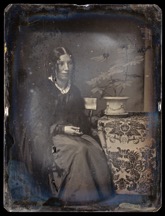Reformers Context
As American society progressed and all free white males had gained rights, many other groups of people like women and other minorities were denied rights of their own. 19th-century reform movements in America began as a struggle between enlightenment and transcendentalist ideas. Americans were afraid of becoming too much like Europe, and so these reform movements began as a means of differentiating and refining American society.
Reformers advocated for equality among various groups of people. Reform movements during this period included abolitionism, utopianism, prison and mental institution reform, temperance, American Indian rights and an ongoing struggle for women’s rights. Writers like Ralph Waldo Emerson and Fanny Fern used their influence to promote various reform movements.

Transcendentalists believed all people were born good. Thus, Transcendentalists believed that the only reason people would act against their innate character was because their society had corrupted them. This belief aided in promoting social reforms in order to improve American society.Transcendentalist authors like Emerson didn’t generally promote religion but instead promoted a spiritual connection with nature and oneself. Other Transcendentalist authors like Henry David Thoreau also promoted self-sufficiency and social reform within America. Thoreau specifically spoke out against the Fugitive Slave Act, and even refused to pay his taxes because he believed the law was unjust.Transcendentalism wasn’t the only factor in promoting reform. After the Second Great Awakening, there was a resurgence of Puritan values which helped instill Christian rhetoric as grounds for reformers. Movements like temperance, abolition, and women’s rights were strongly supported by many Christians.

Abolition was one of the biggest and most controversial social reforms of the 19th century, and impactful writers and numerous slave narratives that were published argued the end of slavery through ethics and religion. Although slavery had always been a contentious discussion in America, the Second Great Awakening caused many people to reflect deeply on their beliefs, morals, and religion. Angelina Grimke was a writer motivated by Christianity and even published an article entitled “Appeal to the Christian Women of the South,” offering practical advice for wives of slave owners. Literature like Uncle Tom’s Cabin, written by Harriet Beecher Stowe, made American Abolition a global debate. Writings like these paired with slave narrative further fueled the anti-slavery debate which greatly separated the north and south, ultimately leading to the Civil War.
Alongside the anti-slavery debate, there was a strong resistance to the Indian Removal Act. Under the Naturalization Law in 1790 American Indians were not deemed United States citizens and thus were stripped of rights. Elias Boudinot, the editor of the Cherokee Phoenix, was a leader in the Indian removal act and spoke against the government. Ultimately, he gave up the fight and was killed as a traitor to American Indians after agreeing with the Treaty of New Echota. Although his original publications incited strong support for the native people.
The 19th century reform period was strongly motivated by both the Second Great Awakening and Transcendentalism. Authors of the time used their influence to spread new social ideals and assist in defining American Literature and the culture that grew from it.